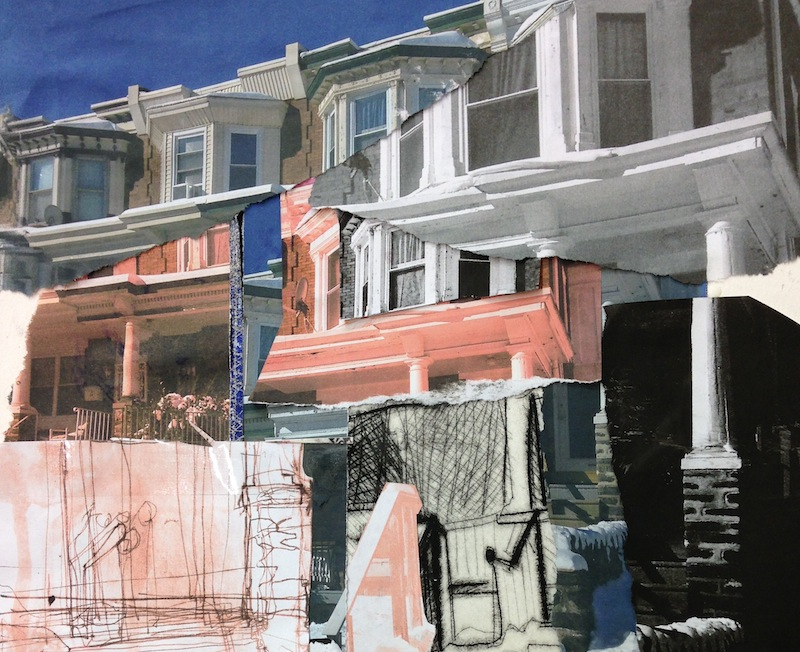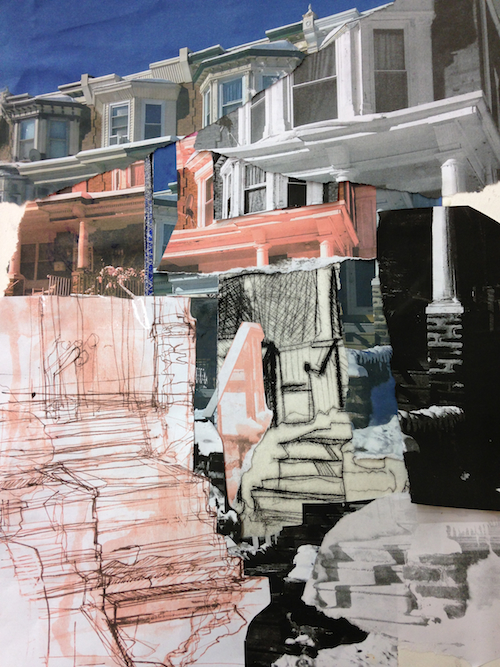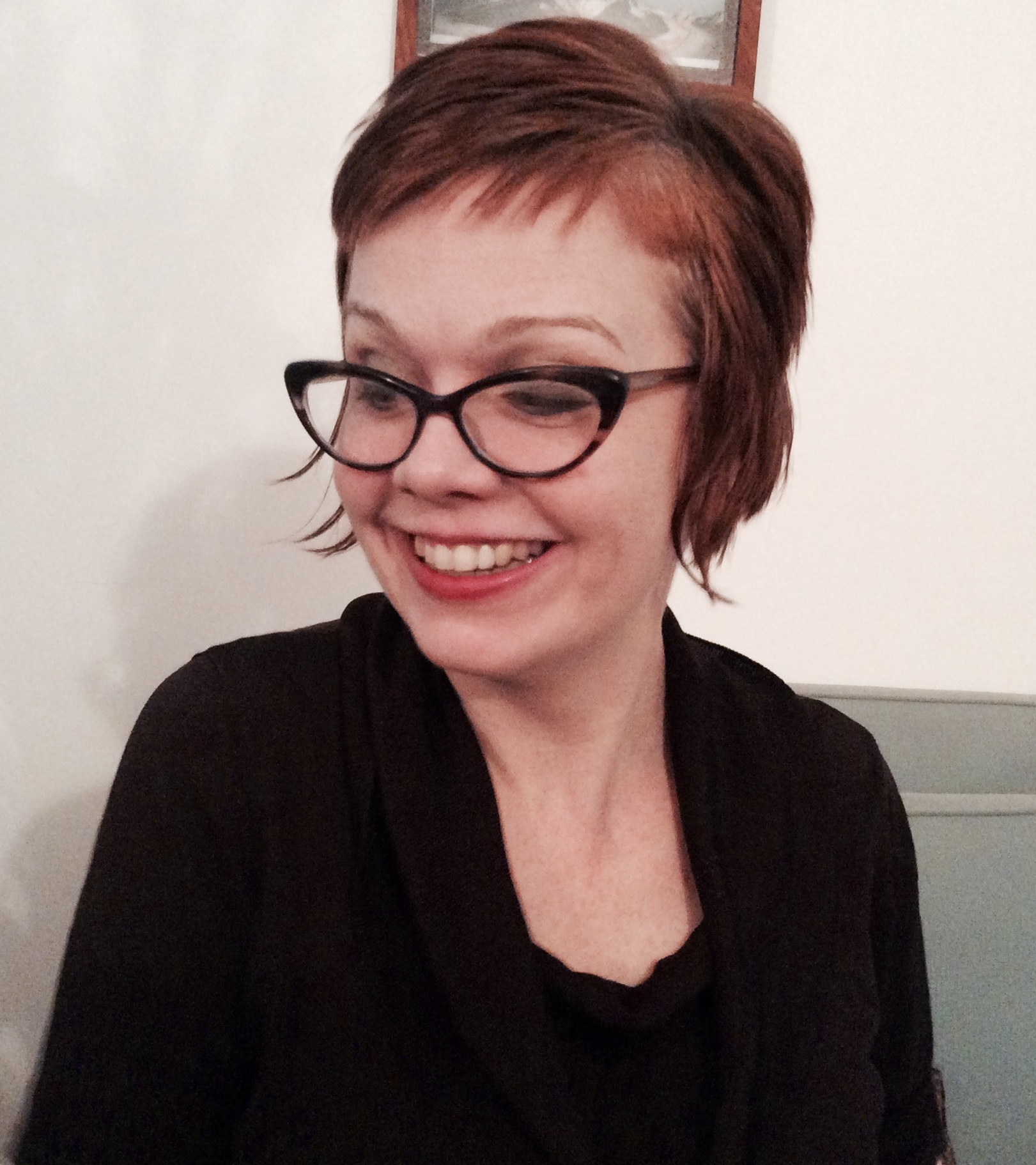Hybrid Poetry by Sue Landers
Racism in the City of Brotherly Love

It is difficult—to begin a story—when one is far away from the beginning—when there was a little house a lot of children not a lot of money—and a lot of neighbors.
Perhaps everything will come to be showing something.
And that will be the happy ending of all this beginning.
Outside the row house not an airlite but a shotgun or a railroad—were the neighbors—and some of the neighbors were new—and some of the neighbors were old—but most of the neighbors by the time I came to the house were new—or so they told me.
My siblings told me—that before I came to the house—old neighbors moved out and new neighbors moved in and all of this happened very quickly they said—the moving vans like magic—so quickly they called it flying—they flew like birds from those fleeing a fever a flu.
New neighbors moved in—and old neighbors flew out—old neighbors flew to houses next to houses with people who looked like them—but we didn’t fly away the way other white people who looked like us did.
And this might have been because of money—I say might because these changes were not discussed or explained—but there were many children and not a lot of money so this reason seems reasonable.
Or maybe we didn’t fly away the way others who looked like us did because of a feeling—I say maybe because these feelings were not discussed or explained—but there was an exchange my sister told me—much later a sister told me—our mother had asked them a question—a question not meant to be answered—a question about a feeling—the question was how would you feel—if you moved into a new house—and all your new neighbors moved away.
Or maybe we didn’t fly away because of the church—I say maybe because these details were not discussed or explained but much later I heard about a meeting—a meeting at the church where the men of the church—the priests—told the neighbors not—to sell their houses—told the white neighbors—not to sell their houses to black people—that to do so would be a beginning of an end—I need to go back before the beginning.
Beginning a new thing without leaving the last thing.
Always compelling to understand the reason.
All the doing and the moving.
Moving through a country is never done quickly.
Not like moving vans like magic—this place of seeking and pushing and fleeing and living—pushing and living and seeking and fleeing—projects like this take time.
Much earlier than any of this Franklin had a project—he wrote let all things have their places—he ruled each page with red ink to keep track of his rights and his wrongs.
And I return to him as I return to the surveyors and their maps—the maps made long after Franklin—the maps made before any meetings or moving vans like magic—the maps—relating traits of individuals to whole groups of individuals—the maps ruled with lines and shades to grade areas by color.
One map contained a house on a street named for no one—this street was shaded yellow to signify transition—a shade meaning an area at risk of infiltration—of infiltration by what the mapmakers called—a lower grade population.
From time to time.
Twenty years after this map was drawn—my father bought a house on a street shaded yellow—he bought his house from a woman who looked like him—on a street full of people who looked like him—surrounded by streets full of people who looked like him—and then there was a meeting.
It was around this time there was a meeting at the church—the church where my mother and father were married—the church where they baptized their babies—the church where there was a meeting that my parents may or may not have gone to where the priests told the neighbors—not to sell their houses.
A little later than this people who looked like my father started buying houses in areas far away from areas shaded yellow—it was around this time that there was a burning—a burning at my uncle’s house after he sold his house to someone who didn’t look like him—someone who looked like my uncle burned a cross on his lawn—and his baby remembers—my uncle’s baby remembers—she tells me about ash on the lawn in the morning—and she tells me so forty years later.

It was around the time of the burning—that all of my father’s brothers—and all of my mother’s sisters—drove all of their children to houses next to houses of people who looked like them—old neighbors moved out and new neighbors moved in—and all of this happened very quickly they said—but moving through a country is never done quickly—what happens quickly is a story short of details—a story short on details I am telling.
I am telling you that it’s likely—that if my father had more money or less children—or a car or a different religion—or a desire to change—or a desire to not change—or a greater or lesser desire to keep everything exactly the same—we would have flown away the way others who looked like us did—but these things were not discussed or explained—and we didn’t—and I am explaining that.
From time to time on pieces of paper such thoughts.
I sit down to write them for you.
Publishing Information
- Most of the italicized lines (up to “Moving through a country is never done quickly”), with a few slight alterations, are from Gertrude Stein’s The Making of Americans, originally published by Contact Editions in 1925 (Dalkey Archive Press, 1995).
- The last italicized lines, starting with “From time to time,” are from The Autobiography of Benjamin Franklin, originally published in book-length form in 1791.
Art Information
- Photo Collage © Ann Beatus; used by permission.
 Sue Landers's third book of poems, Franklinstein, is available from Roof Books. She is also the author of 248 mgs.: a panic picnic and Covers (both from O Books). Her chapbooks include 15: A Poetic Engagement with the Chicago Manual of Style and What I Was Tweeting While You Were on Facebook. Recent poems have appeared in the Offing, Brooklyn Rail, and Philadelphia Review of Books. She lives in Brooklyn.
Sue Landers's third book of poems, Franklinstein, is available from Roof Books. She is also the author of 248 mgs.: a panic picnic and Covers (both from O Books). Her chapbooks include 15: A Poetic Engagement with the Chicago Manual of Style and What I Was Tweeting While You Were on Facebook. Recent poems have appeared in the Offing, Brooklyn Rail, and Philadelphia Review of Books. She lives in Brooklyn.
Of this hybrid work, she says:
Drawing inspiration from Ben Franklin, Gertrude Stein, historical research, and autobiography, this documentary poem explores how institutional racism and white silence shaped one Philadelphia neighborhood.
